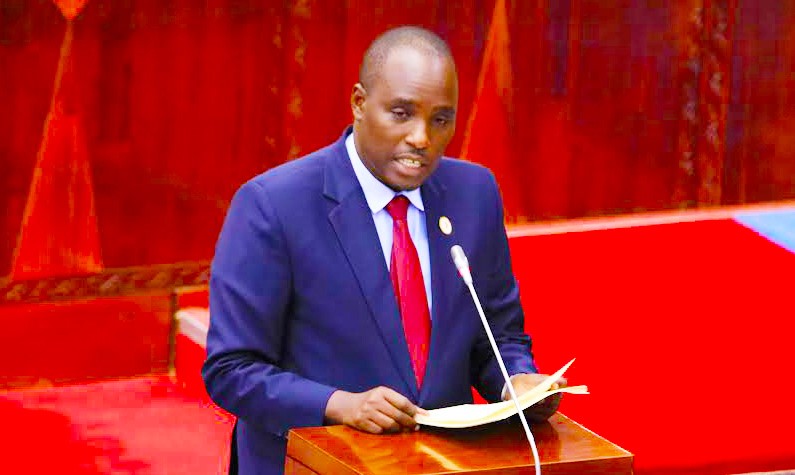Pressure for ban of caning grows after pupil’s death

What you need to know:
- The government accuses some teachers of overdoing it, but parents and activists want the trend to be stopped.
Dar es Salaam. Caning of schoolchildren has sparked a huge debate in Tanzania.
The government accuses some teachers of overdoing it, but parents and activists want the trend to be stopped.
According to the government notice number 294 of the 2002 amendment to the Education Act, a schoolchild should be caned on a hand or on buttocks with a light, flexible stick. There should be no more than four strokes.
In Kagera Region, a 13-year-old pupil Sperius Eradius died on August 27 after he was allegedly beaten by his teacher who accused him of stealing another teacher’s wallet.
Also recently, in Geita, a Form Five student at Kalangalala Secondary School lost consciousness after he was allegedly punished by his teacher.
More than 100 Kalangalala Secondary School students gathered at the District Commissioner’s office to protest against the beating of their fellow.
The Tanzania Media Women’s Association (Tamwa) condemned the incidents, describing them as cruel.
Tamwa hopes “beatings and murders at schools will not be repeated”.
In reaction, Sperius’ guardians demanded the suspect be arrested and the school head suspended. Two teachers have been arraigned over the incident.
The Ministry of Education, Science, Technology and Vocational Training strongly condemned the beatings, saying they were unlawful.
Deputy minister William ole Nasha told The Citizen that caning was the last resort punishment and was applied only to pupils or students involved in gross misconduct.
“It should be issued rarely, and this is the government stand,” said Mr Ole Nasha.
He termed teachers who punish schoolchildren to the extent of injuring or killing them as “criminals”.
“If that happens, the ministry leaves the case in police hands because it is criminal. To avoid such incidents, the ministry has been reminding teachers to adhere to guidelines.”
The ministry did not remove the stick as a punishment because traditionally it is used to discipline children, but there are guidelines.
Corporal punishment is allowed under a 1979 law, but with restrictions.
The punishment shouldn’t be administered by any teacher but a school head.
Section 4 (1) of the guidelines stipulates that the head of the school in his/her discretion may administer corporal punishment or may delegate his/her authority in writing to a carefully selected member of his teaching staff and that provided that the authorised member of staff may act only with the approval of the head of the school on each occasion when corporal punishment is administered.
“On every occasion when corporal punishment is administered it shall be recorded in a book kept for this purpose and such record shall state in writing and signed,” said Mr ole Nasha.
The punishment should be recorded in a special book, indicating the name of the pupil, the offence or breach of discipline, the number of strokes and the name of the teacher who administered the caning.
Mr ole Nasha said: “The guidelines provide that a female pupil/student must be punished by a teacher of the same gender.”
According to him, the ministry insists that teachers focus on alternative ways of punishing pupils or students instead of relying on sticks.
Teachers are instructed not to carry sticks all the time, they have to keep them somewhere and enter classrooms with books and other teaching materials as instructed in their schemes of work.
According to the education policy, sticks are not part of teaching tools as all teachers are well trained on how to handle all kinds of pupils whatever difficulty and challenging they are.
“Sticks affect the learning process. Let schoolchildren face normal punishment instead of caning them,” noted Mr ole Nasha.
The Tanzania Association of Managers and Owners of Non-Government Schools and Colleges (Tamongosco) says canes are persistently used because the coordination between teachers and school committees is poor.
It believes that heads of public schools have no guts to punish teachers who violate guidelines on the welfare of their pupils or students as the law indicates that the matters should be handled by education officers.
Public schools have school boards or committees whose members are appointed from among parents. The secretary of the board/committee is the school head.
Tamongosco secretary general Benjamin Nkonya called on the government to ensure that the guidelines are adhered to.
“This cannot happen in private schools because we know how to raise and guide children. Here, there is a proper coordination and respect to humanity,” he said.
He supported the government that teachers should not use sticks to punish students. Instead, they have to use alternative ways of punishing schoolchildren.
However, human rights activists demand that corporal punishment be abolished in schools.
The national coordinator of the Tanzania Human Rights Defenders Coalition, Mr Onesmo Olengurumwa, spoke about the need to abolish sticks punishment in schools.
SOS Children Village coordinator Mpelli Ally suggested that the measures should not only be taken to teachers who executed the punishment but to all who witnessed it.
“Those who were around must also be responsible. How come you see the inhuman incident happening next to you without intervening?” he challenged.
He spoke about the need to promote children’s rights.
“Beatings are really inhuman and should be condemned by everyone. Let all of us adhere to regulations and violators should face the law accordingly.”
Mr Olengurumwa and Mr Ally call on teachers to use alternative ways of punishment.
Ms Faraja Nyalandu, the founder of Shule Direct -- an online platform that provides educational learning content for students and teachers in secondary schools-- was concerned about the beatings of schoolchildren.
In her social media account, she said the beating was not the right way of parenting.
“They would become scared of everything and eventually fail to learn. They are our children no matter how stubborn they are,” said Ms Nyalandu, the mother of two. She called on parents and teachers to protectchildren.
Some parents told The Citizen that before a schoolchild is admitted he or she must undergo a thorough health check-up and a report be submitted to the school for the record.
This was a normal procedure in the past but it has been ignored recently. “The government should revive it,” said a nurse.
According to her, there had been a tendency of students to fill in medical forms without being examined by doctors.
“Because of forgery a teacher will not know the real health condition of the student they are dealing with him or her.”
The Legal and Human Rights Centre noted in a statement that “the school is supposed to be a very safe place for students to enjoy their fundamental right to education”.
It called on the government to review the school punishment regime. “Severe sanctions should be imposed on teachers who commit criminal acts against students, to serve as an example,” AFP quoted the centre as saying.




